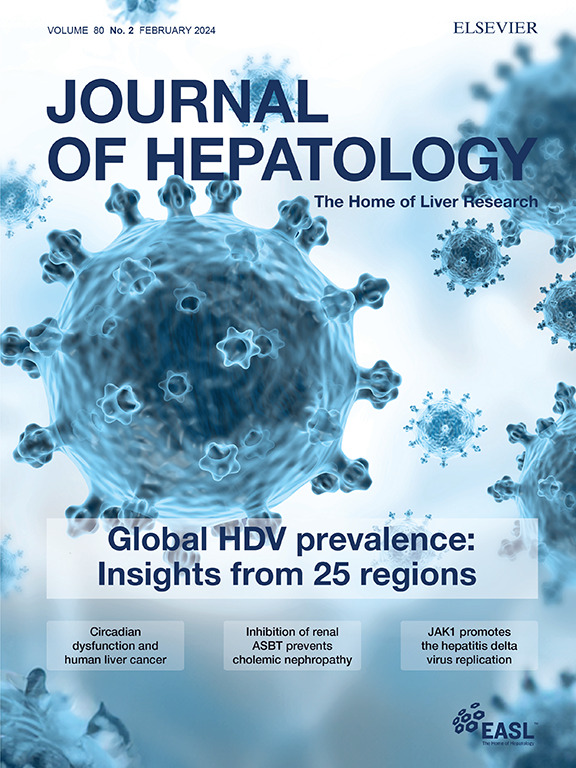白蛋白治疗时间对肝硬化合并急性肾损伤患者反应率和转归的影响
IF 26.8
1区 医学
Q1 GASTROENTEROLOGY & HEPATOLOGY
引用次数: 0
摘要
背景和目的指南建议肝硬化合并急性肾损伤(AKI)患者使用白蛋白扩容 48 小时,以纠正低血容量并排除肾前性 AKI。最近,急性病质量倡议(ADQI)-国际腹水俱乐部(ICA)共识指南的更新建议将这一时间缩短为 24 小时,这主要是基于专家的意见。本研究旨在评估白蛋白治疗 24 小时和 48 小时后的反应率,并比较和评估白蛋白治疗反应的三种不同定义的预后意义。方法 分析了来自两个德国中心的 127 名前瞻性招募的肝硬化和 AKI 患者的数据。我们研究了 24 小时和 48 小时后的三种反应定义:(1)血清肌酐(SCr)下降 0.3 mg/dl;(2)SCr 下降 25%;(3)SCr 至少下降一个 AKI 阶段。随访时间延长至肝移植、死亡或血液透析(HD)。结果总的来说,根据不同的定义,30%-54%的患者对白蛋白治疗有反应,不同 AKI 阶段的反应率均衡。值得注意的是,在 48 小时内有反应的患者中,有相当一部分在最初 24 小时内没有反应。在第二个 24 小时内对白蛋白有额外反应的比例分别为 38%、24% 和 25%(定义 1、2 和 3)。结论 相当一部分患者需要 48 小时才能对白蛋白治疗产生反应。本研究为肝硬化合并急性肾损伤(AKI)患者白蛋白治疗的最佳持续时间提供了有价值的见解,对最近提出的缩短白蛋白治疗时间的建议提出了质疑。此外,研究还评估了白蛋白反应的最佳定义(至少降低一个 AKI 阶段)。这项研究的结果与临床高度相关,因为缩短白蛋白治疗时间可能会导致过度使用特利加压素,而选择白蛋白应答定义缺乏证据支持。临床医生可以利用这些研究结果更好地预测治疗结果,避免液体超负荷,改善患者预后,同时也要考虑使用特利加压素早期干预的潜在风险。本文章由计算机程序翻译,如有差异,请以英文原文为准。

Effect of albumin treatment duration on response rates and outcomes in patients with cirrhosis and acute kidney injury
Background and Aims
Guidelines recommended volume expansion with albumin for 48 hours for patients with cirrhosis and acute kidney injury (AKI) to correct hypovolemia and rule out prerenal AKI. A recent update in the Acute Disease Quality Initiative (ADQI)-International Club of Ascites (ICA) consensus guidelines suggested shortening this duration to 24 hours, primarily based on expert opinion. This study aimed to evaluate the response rates to albumin treatment after 24 and 48 hours and to compare and assess the prognostic significance of three different definitions of response to albumin therapy.Methods
Data from 127 prospectively recruited patients with cirrhosis and AKI from two German centers were analyzed. We examined three response definitions after 24 and 48 hours: (1) serum creatinine (SCr) decrease > 0.3 mg/dl, (2) SCr decrease >25 %, and (3) SCr decrease in at least one AKI stage. Follow-up was prolonged until liver transplantation, death or hemodialysis (HD).Results
Overall, 30-54 % of the patients responded to albumin treatment depending on the definition, and response rates were balanced across AKI stages. Notably, a relevant number of patients who responded at 48 hours did not respond within the first 24 hours. Additional response to albumin during the second 24 hours were 38 %, 24 %, and 25 % (definitions 1, 2, and 3, respectively). Response according to definition 3 was associated with a better HD- and transplantation-free survival.Conclusion
A substantial proportion of patients requires 48 hours to respond to albumin treatment. Shortening time of albumin therapy may lead to overtreatment with terlipressin.Impact and Implications
This study provides valuable insights into the optimal duration of albumin treatment for patients with cirrhosis and acute kidney injury (AKI), challenging the recent recommendation of shortening the treatment period with albumin. Furthermore, the optimal definition for response to albumin (reduction of at least one AKI stage) has been assessed. The results of this study are highly clinically relevant since shortening albumin therapy may lead to overtreatment with terlipressin, and evidence to support the choice of the definition of response to albumin was lacking. Clinicians can use these findings to predict treatment outcomes better, avoid fluid overload, and improve patient prognosis while also considering the potential risks of early intervention with terlipressin.求助全文
通过发布文献求助,成功后即可免费获取论文全文。
去求助
来源期刊

Journal of Hepatology
医学-胃肠肝病学
CiteScore
46.10
自引率
4.30%
发文量
2325
审稿时长
30 days
期刊介绍:
The Journal of Hepatology is the official publication of the European Association for the Study of the Liver (EASL). It is dedicated to presenting clinical and basic research in the field of hepatology through original papers, reviews, case reports, and letters to the Editor. The Journal is published in English and may consider supplements that pass an editorial review.
 求助内容:
求助内容: 应助结果提醒方式:
应助结果提醒方式:


